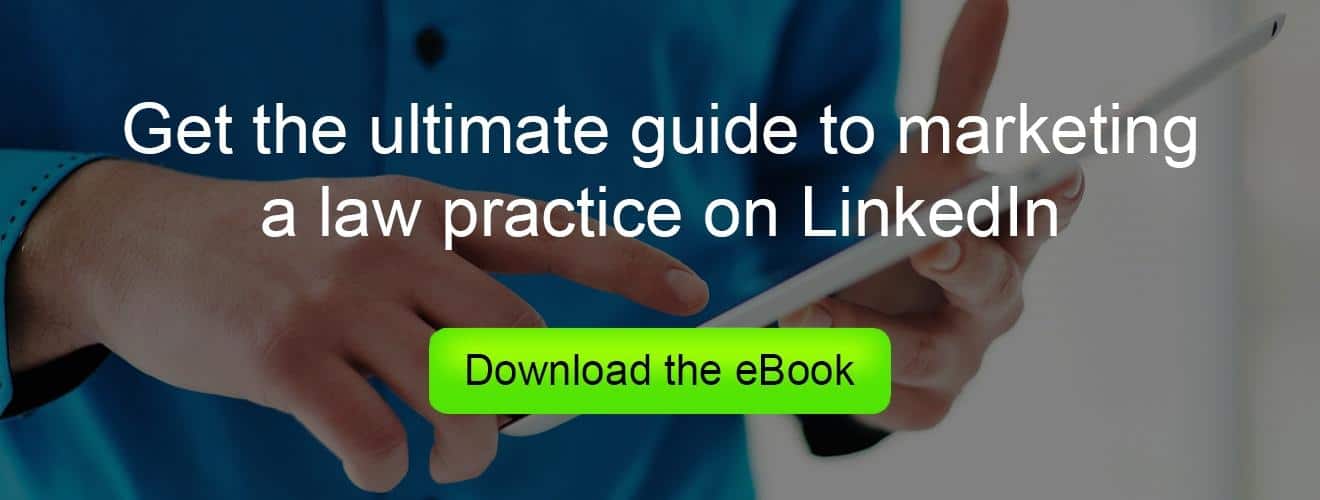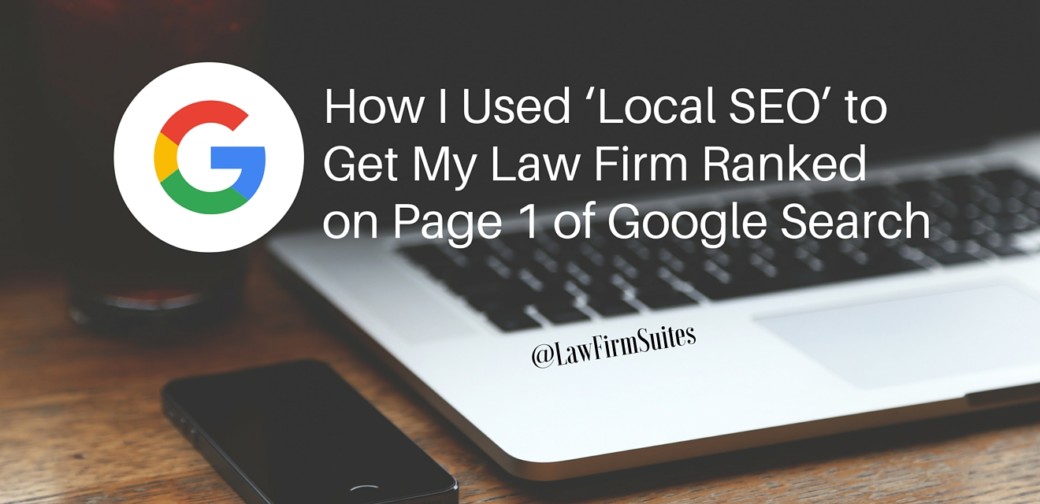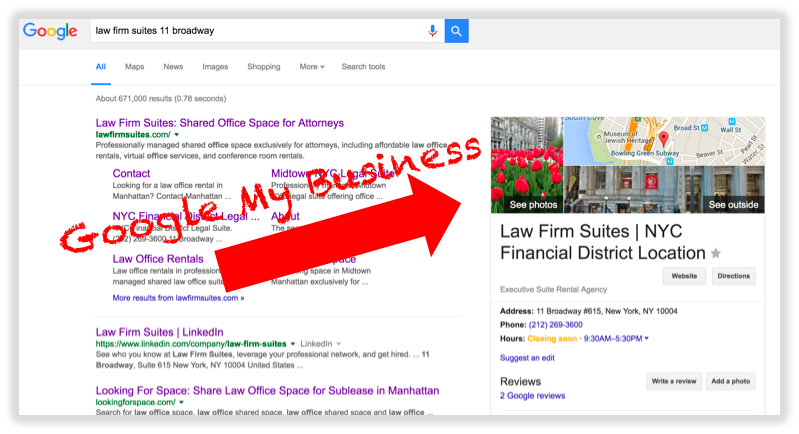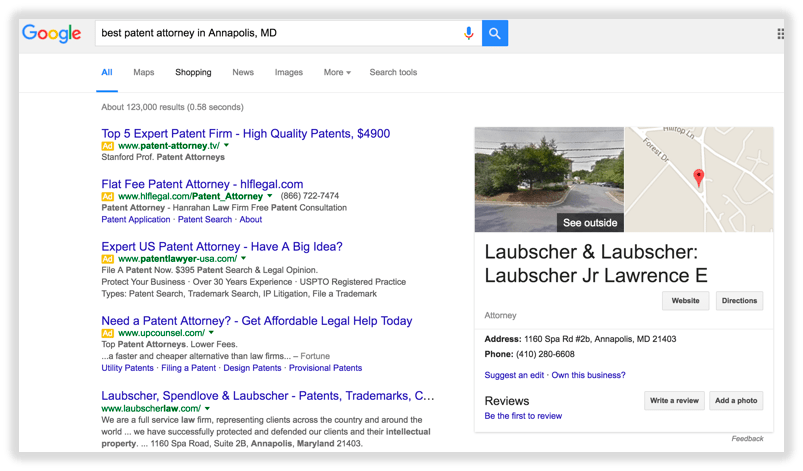Attorney Charles Smith, shares how he got his firm’s website to rank on Google’s first page for competitive personal injury keywords using a DIY local search engine optimization strategy.
Differentiation. It’s a word that is used often in legal marketing, but it can be difficult to achieve in today’s crowded market. How can a small firm with a limited budget stand out?
Consider this: is it really about standing out, or is it simply about being the first one to show up?
If you can impress clients, then perhaps all you need is to do is get your name in front of them first.
How can you do this? Try search engine optimization (SEO).
Why is SEO important for law firms?
According to a recent Avvo study, 31% of all legal consumers are researching lawyers online and 95% of them said online reviews matter to some degree in helping them decide who to hire.
Nearly 60% of consumers use search engines to find products they want to buy. These statistics do not only apply to products like nail polish or power tools. Consumers are looking for lawyers online too.
Most of your future clients will be researching legal services online before they pick up the phone to schedule a consultation. Luckily, you can use SEO to make sure prospects are finding your website in online searches before they discover your competitors’.
Is legal marketing really about standing out or is it simply about being the first one to show up? #seo Click To TweetThe bottom line is that if your law firm isn’t showing up in online searches, then you’re missing out on new business. Getting on the first page of a search may seem impossible, but that’ is where local search comes into play.
Note: If you aren’t familiar with SEO, then it’s a good idea to check out an overview first. This post focuses on a specific subcategory: local SEO.
What is local SEO?
In short, local search means search engines produce results calculated with location data. It’s especially useful for small businesses because it reduces the first page of search results to local competition only.
For example, if you run a small personal injury firm located in Mt. Kisco, New York, then you can use local SEO strategies to make sure anyone looking for a personal injury lawyer in Mt. Kisco finds your website when they enter a web search query.
How to improve your firm’s local SEO
Don’t be fooled by companies trying to sell you $2000-per-month subscriptions. A decent local SEO campaign is not as hard as it seems.
I should know. With a budget of only a few hundred dollars, I was able to land my former employer’s website on the first page of Google within about four months. Yes, four months may seem like a long time, but it’s worth it – think of it as an investment.
For better or worse, you must do your best to please Google’s algorithm, to make it think you’re relevant in your given location. The good news is that when it comes to local SEO, a few best practices will go a long way toward doing just that.
1. Claim your address on Google My Business
You know those little boxes that appear in Google search results listing company names, addresses and hours of operation? That is Google My Business.
Google My Business boosts visibility in search, map searches, and Google+. As far as SEO goes, if you’re not on Google My Business, then you have no business.
Getting your law firm listed on Google My Business is as simple as visiting Google’s dedicated site and signing in to claim or add your business address. You then go through a simple verification process of sending a postcard back to Google or, in some cases, verifying by phone or through instant verification. A full explanation of how to get your business on Google My Business is available on Google’s support page.
Once your listing is approved, make sure you optimize it with a lot of photos that include keyword-rich descriptions that let visitors know what your firm is all about.
2. Get your “NAP” consistent and on every page
It’s critical to remember that the Google algorithm only knows what you tell it. Let visitors know who you are, where you are, and how to get in touch with you by providing your name, address, and phone number (NAP).
NAP is somewhat unique in that it’s the only instance where your site benefits from duplicate content on each page. For all other instances, duplicate content is a signal that a given web page lacks originality.
Google search only knows what you tell it. Tell visitors who and where you are, and how to be in touch #seo Click To TweetThe most important part of NAP is to remain consistent because consistency provides credibility. For example, if you have “Suite 300” on one page, don’t write “Ste. 300” on another.
In some cases, your business will be listed somewhere unknowingly without you knowing and you must track down that listing so you can edit it, or contact the person managing the site so they can change it. Something as simple as a misplaced hyphen could have a major impact. Tools like Yext or Localeze can help you track down these listings.
3. Develop relevant, original content
A good rule of thumb to remember is that SEO is ART: Authority, Relevance, and Trust. When your site is new, it has no authority or trust in Google’s eyes. To build those two essential traits, you must provide relevant content.
You can easily start producing content and supporting your local SEO keywords with original blog articles. Studies show that marketers who prioritize blogging are 13 times more likely to see a positive ROI, which means you should be blogging for your firm anyways. Additionally, search engines will also give preference to sites that are always publishing new content, so always remain consistent with your blogging.
When it comes to keywords, try writing some content for long-tail keywords, which are highly-specific keywords with a low search volume. There will be less competition for these.
For example, if you’re an intellectual property attorney in Annapolis, Maryland, you wouldn’t only target generic keywords like “intellectual property attorney.” Instead, you would target specific, long-tail keywords like “best patent attorney in annapolis md.”
4. Get citations
Don’t worry. Web citations aren’t the same as legal citations. No Bluebook needed here. A web citation is any reference to your company on another site.
Keep in mind that citations are different from backlinks, which are links on other websites that send visitors back to your web pages. The main difference is that links are not required for citation strength; however, they can definitely help.
Where do you go to get a citation? Start with legal directories. Some legal directories provide free profiles. Every page that has your NAP is a signal to Google that your company is real, relevant, and trustworthy.
Check out the Moz Local tool or Whitespark’s Local Citation Finder to find high-quality directories online. Conduct searches for both category and geographic terms to find places you can be listed.
5. Ensure each geographic area you serve has it’s own web page
Gone are the days when lawyers could list “area served” on every website page footer with a reference to every nearby municipality and neighborhood. Some sites still do this, but it’s spammy. A far, far better approach is to create a web page for every location you serve.
For example, imagine you practice immigration law with an office in the Financial District of Manhattan. You’re obviously going to want to target potential clients in high-immigrant communities and neighborhoods.
To maximize your presence, go as narrow as possible. Focus one page of your website per specific neighborhood and mention the neighborhood along with your practice area.
If you want to target Flushing, Queens, then create a page with the title tag “Flushing Immigration Lawyer.” On the page, make specific references to the location. The copy of the page doesn’t have to be long—– four hundred to five hundred words is fine as long as it’s original.
6. Use social media
It’s still unclear how much social media impacts SEO, but it’s indisputable that it does have an influence when it comes to driving traffic and supporting personal branding. Also, just because Google doesn’t currently incorporate social signals into search rankings doesn’t mean it never will.
Currently, your law firm should be on social media to drive qualified traffic to your website. The more traffic your website gets, the more site authority it will have and eventually you’ll see an increase in your rank in search results.
Remember that Google indexes social media websites just like it does any other website, and your firm’s profiles will show up in search results. Make sure you’re optimizing your profiles with your NAP and keep them updated in case prospective clients find them.
7. Encourage online reviews
Studies show that 61% of consumers will read product reviews before making a purchase and 88% of customers trust online reviews as much as personal recommendations, which means a good online review could be the deciding factor that gets you hired.
When it comes to local SEO, getting reviews and positive ratings will improve your ranking with Google My Business. Google determines local ranking based on three things: relevance, distance and prominence. More reviews indicate to Google that your business is prominent in a given geographic area.
Keep in mind that reviews are for searchers more than anything. You should aim to get positive reviews posted on Google My Business, Avvo, your personal LinkedIn profile and on your firm website. These testimonials, endorsements and reviews will support your legitimacy as well as improve your local SEO.
As a side note, be mindful of the ethics of using online reviews for your law firm and make sure you’re following your state’s professional conduct rules. There are certain things you can’t do to get an online review and some phrasing or language may be prohibited.
8. Get quality backlinks from a local source
As previously explained, backlinks are links on other websites that direct visitors back to your website. They improve your search rank because they make your site seem more credible; however, you should aim for quality, not quantity in this area. Getting a backlink from a website with greater site authority is worth more than several backlinks from websites that don’t get a lot of traffic.
Localize your focus when it comes to getting backlinks. For example, links from a local Chamber of Commerce, the Better Business Bureau, or an educational institution, isare a wonderful boost for your SEO efforts.
Depending on your funds, you can also try sponsoring a local charity race or partnering with a university to offer a modest scholarship. These are not only good deeds, but they also provide you with an authoritative backlink.
Other sources for quality backlinks include local newspapers, local business indexes, blogs from other local businesses, etc. Your social sharing, content development and outreach will play a huge role in this effort. Keep producing good content on your blog and look for opportunities to develop relationships.
9. Approach keywords as if SEO doesn’t exist
Google is constantly adjusting its algorithm with the purpose of weeding out overly-optimized content. The “Hummingbird” update of 2014 marked a dramatic shift in Google’s algorithm.
For example, Google no longer interprets queries based on individual keywords, but instead looks to the intent and context behind the keyword.
What does all of this mean? In short, don’t worry TOO much about your keyword usage and avoid “stuffing” your website with them to improve your search ranking.
Writing in a conversational, natural way is the best way to earn trust in the eyes of search engines. It also provides a more enjoyable reading experience for people visiting your site. The longer a person stays on a given page, the better your website will rank in searches.
To sum up, SEO is an ever-changing landscape and it’s imperative for any law firm’s growth to stay up-to-date on new developments. Only by implementing best practices will a small firm’s website appear on the the coveted “page one” of search results.
If you have any questions about how to optimize your law firm’s website for search engines, please don’t hesitate to contact me at [email protected].






Pingback: Tips To Get Your Law Firm Website On The First Page of Google | Marketing Journal
on said:
Great, informative article for someone looking to do seo themselves. I especially like when you said Google only knows what you tell it. Most people get this confused thinking Google knows how to think extensively. It’s a computer, it reads what you give it.
on said:
Enchanted such an extraordinary add up to be here, a huge amount of accommodating data are here which is informative.i going to bookmark your site please keep posting.It’s an unimaginable post.
Pingback: Law Firm Marketing Plan | Enable Design
on said:
Hi to all, a Well written blog post about blogging. Enjoyed your post! and very appreciative of the support you give to beginners. It is inspirational for me about blogging. Especially thanks and I LOVE the way you are keeping me informed. I have learned thus far…
on said:
Hello Admin,
I must admit it you’ve nailed it with the basics of SEO. I’m sure any new blogger will learn the information that he/she needs. SEO is really the revenue bringer for any business, law firm, individual lawyers, small business owners.
Making the brand identity in a right way from grass level and keeping ourselves updated on Google algorithms is really important practice for any internet marketer.
Overall, i really enjoyed reading this article.
Cheers!
Mudassir
on said:
Nice, information. Article for someone who looking to learns SEO. Most people get this confused thinking Google knows how to think extensively. Best Article Thanks
on said:
Thanks for sharing this amazing article, it is very informative post good work keep it up.
on said:
Most people get this confused thinking Google knows how to think extensively.
on said:
Great strategy define and a great selection of words thanks for share.
on said:
Thanks and everything is shared in this blog in an unique way. keep it up.